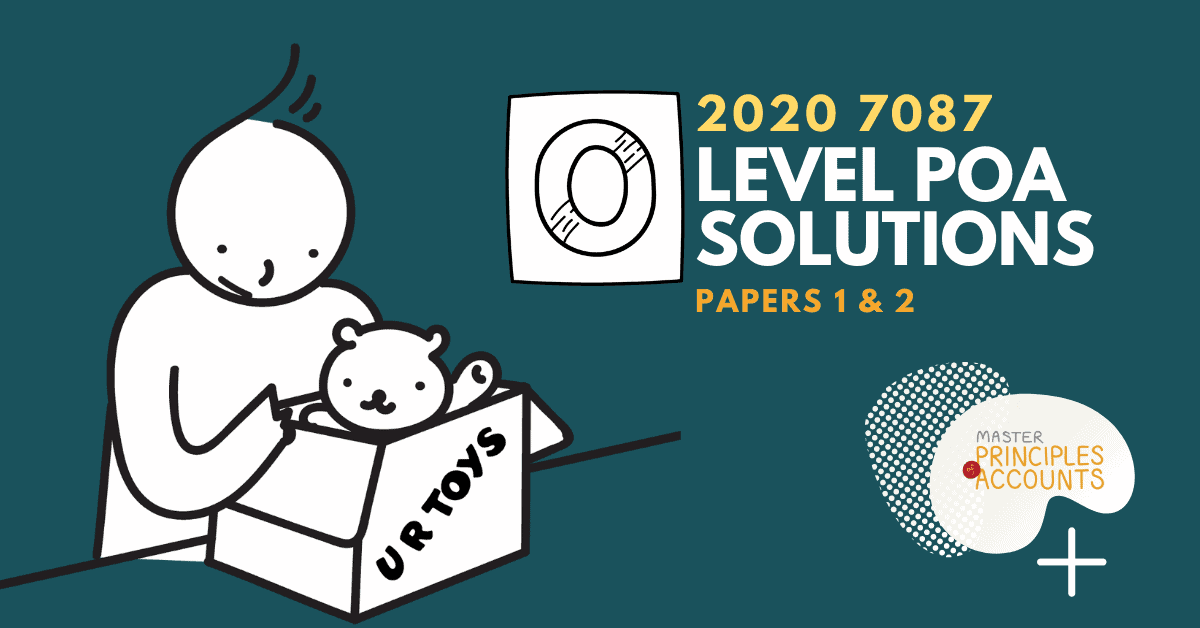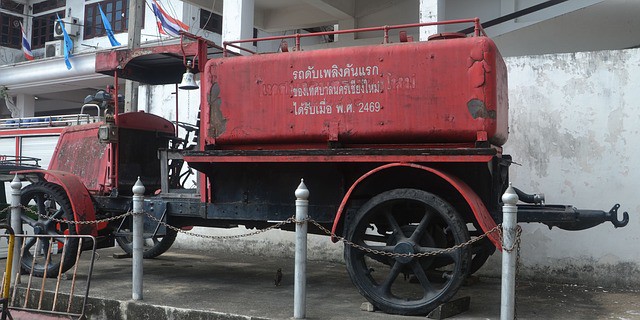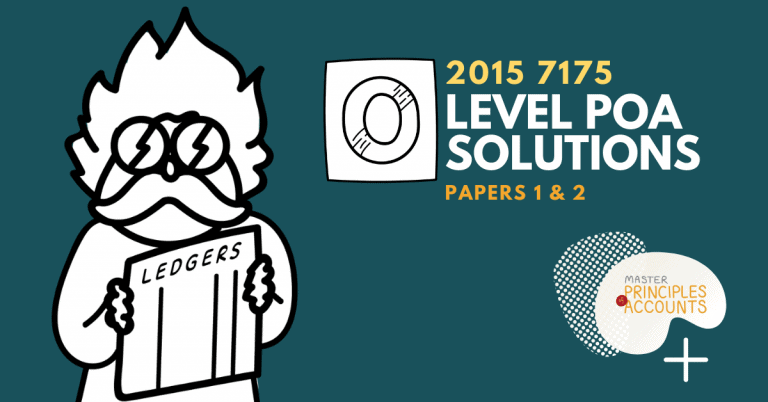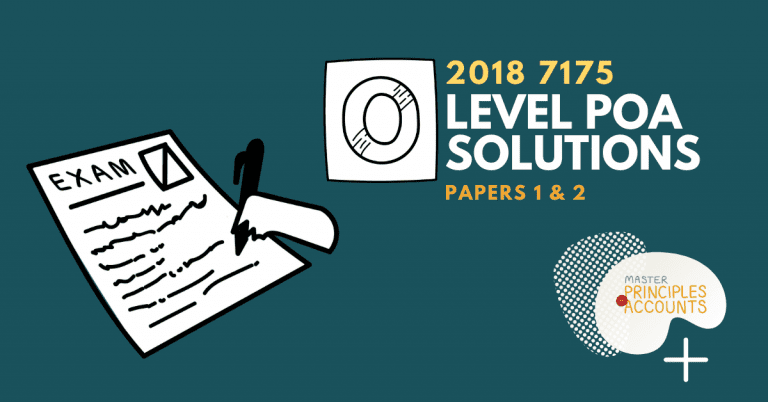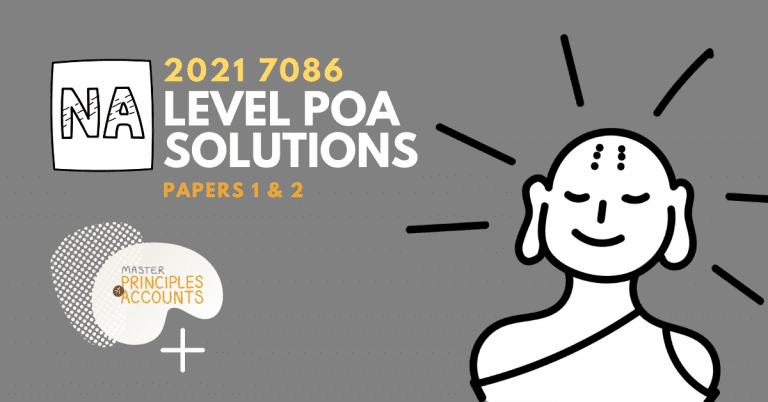2020 O Level POA Answers 7087
Paper 1 :
ai) Profits not distributed to the shareholders and retained in the business for future use. It is carried forward to the next accounting period.
ii) Accumulation of profits and losses that has not been distributed to shareholders.
b)
- The company issued new shares capital during the year.
- Profit and loss during the year
- Declaration of dividends
c)
Statement of Financial Position as at 30 June 2020 (extract)
| Shareholders’ Equity | $ | $ | $ |
| Issued share capital, 500 000 ordinary shares (600000 + 1.5×100000) | 750 000 | ||
| Retained Earnings (225 000+175 000-(0.1×700000) | 330 000 | ||
| Total equity | 1 080 000 |
d)
1. Banks
2. Government
Etc; customers, employees, suppliers
a) Ensure arithmetical accuracy in recording and facilitate the preparation of financial statements.
b) A balanced trial balance is not an absolute proof of accuracy of transactions recorded in the ledger accounts. There are some errors, which do not affect the balancing of trial balance, are not revealed by the trial balance.
c) $54 and understated
d) Integrity. To be straight-forward and honest in all business and professional dealings.
e) Going Concern concept
ai) Motor vehicle that was bought at $24 000 was sold on credit.
ii) $11 712 is the accumulated depreciation of the sold vehicle.
iii) Speedy cars purchased the vehicle for $10 800 on credit.
iv) Loss on sale of non-current asset of $1488 was transferred to income summary.
bi) $1500 overstated
ii) $1500 overstated
ai) Xin
Inventory account
| Date | Particulars | Dr ($)+ | Cr ($)- | Balance |
| 2020 | ||||
| Sep 2 | Trade Payables – Ray | 44 700 | 44 700 Dr | |
| 10 | Cost of sales | 28 000 | 16 700 Dr | |
| 22 | Cash at bank | 22 000 | 38 700 Dr | |
| 29 | Cost of sales | 27 600` | 11 100 Dr | |
| Oct 1 | Balance b/d | 11 100 Dr |
ii)
Xin
Sales Revenue account
| Date | Particulars | Dr ($)+ | Cr ($)- | Balance |
| 2020 | ||||
| Sep 10 | Trade receivables – Philippa | 39 800 | 39 800 Cr | |
| 29 | Cash in hand | 42 000 | 81 800 Cr | |
| Oct 1 | Balance b/d | 81 800 Cr |
b) Prudence concept. Prudence concept states that a business should not overstate assets, and in this case, inventory.
c) Xin’s rate of trade receivables turnover has improved from 9.27 times in 2019 to 11.41 times in 2020. This indicates that Xin has been managing her trade receivables efficiently over the years. Gemma’s rate of trade receivables turnover has improved from 6.35 times in 2019 to 8.81 times in 2020. This indicates that Gemma has been managing her trade receivables efficiently over the years. Therefore, both Xin and Gemma rate of trade receivables have improved.
Paper 2 :
XY Pte Limited
Statement of Financial Performance for the year ended 31 July 2020
| $ | $ | |
| Sales revenue | 325 000 | |
| Less: sales returns | (2 400) | |
| Net sales revenue | 322 600 | |
| Less: cost of sales | (94 300) | |
| Gross Profit | 228 300 | |
| Add: Other income | ||
| Rent received (1 000 + 500) | 1 500 | |
| Less: Expenses | ||
| Wages and salaries (78 960 + 560) | 79 520 | |
| General expenses (39 700 – 350) | 39 350 | |
| Equipment repairs (5 600 + 3 000) | 8 600 | |
| Depreciation on equipment (25% x (196 000 – 3 000)) | 48 250 | |
| Depreciation on motor vehicles (20% x (84 000 – 30 240)) | 10 752 | |
| Impairment loss on trade receivables (4% x 20 000 – 600) | 200 | (186 672) |
| Profit for the year | 43 128 |
XY Pte Limited
Statement of financial position as at 31 July 2020
| Cost | Accumulated depreciation | Net book value | |
| Assets | $ | $ | $ |
| Non-current assets | Cost | Accumulated depreciation | Net book value |
| Equipment | (196 000 – 3 000)193 000 | (48 250 + 98 000)146 250 | 46 750 |
| Motor vehicles | 84 000 | (10 752 + 30 240)40 992 | 43 008 |
| Total non-current assets | 277 000 | 187 242 | 89758 |
| Current assets | |||
| Trade receivables | 20 000 | ||
| Less: Allowance for Impairmentof trade receivables (4% x 20 000) | (800) | 19 200 | |
| Inventory | 41 320 | ||
| Cash at bank | 24 300 | ||
| Rent receivable | 500 | ||
| Prepaid general expense | 350 | 85 670 | |
| Total assets | 175 428 | ||
| Equity and Liabilities | |||
| Shareholders’ equity | |||
| Issued share capital, 100 000 ordinary shares | 100 000 | ||
| Retained earnings (18 260 + 43 128 – (0.12 x 100 000)) | 49 388 | 149 388 | |
| Non-current liability | |||
| Long term borrowing | |||
| Current liabilities | |||
| Trade payables | 13 480 | ||
| Wages and salaries payable | 560 | ||
| Dividends payable (0.12 x 100 000) | 12 000 | 26 040 | |
| Total equity and liabilities | 175 428 |
ai)
Utilities expense
| Date | Particulars | Dr ($)+ | Cr ($)- | Balance |
| 2019 | ||||
| Aug 1 | Balance b/d | 682 Cr | ||
| 2020 | ||||
| Jul 31 | Cash at bank | 8 500 | 7 818 Dr | |
| Prepaid utilities | 284 | 7 534 Dr | ||
| Income summary | 7 534 | – |
Utilities expense for the year ended 31 July 2020 = $7 534
aii)
Commission income
| Date | Particulars | Dr ($)- | Cr ($)+ | Balance |
| 2019 | ||||
| Aug 1 | Balance b/d | 500 Dr | ||
| 2020 | ||||
| Jul 31 | Cash at bank | 9 000 | 8 500 Cr | |
| Commission receivable | 800 | 9 300 Cr | ||
| Income summary | 9 300 | – |
Commission income for the year ended 31 July 2020 = $9 300
b) Prudence concept. A business should not overstate profits and revenue and should not understate expenses.
c) Segregation of duties and custody of cash.
d) Bank charges
a)
Liquidity is the ability of a business to convert current assets into cash to repay its current liabilities.
b)
| 30 Sept 2019 | 30 Sept 2020 | |
| Current ratio | 87600/30750= 2.85 (2d.p.) | 102750/54345= 1.89 (2d.p.) |
c) Evaluate the trend in liquidity of the business over the three years ended 30 September 2018, 2019 and 2020. Use the given information and your answer to (b).
Kim’s business has a declining trend of working capital from $57000 in 2018 to $56850 in 2019 and further to $48405 in 2020. Kim’s business has a worsening current ratio of 3.62 in 2018 to 2.85 in 2019 to 1.89 in 2020. It is on a declining trend, and in the recent year 2020, its current ratio of 1.89 falls below the general benchmark of 2. This means that Kim’s business has insufficient current assets to repay its immediate debts.
The quick ratio has worsened from 1.84 in 2018 to 1.42 in 2019 and further to 0.79 in 2020. This shows a declining trend and the most recent quick ratio in 2020 of 0.79 is below the general benchmark of 1, indicating that the business has insufficient assets to pay for its immediate debts.
The worsening of liquidity could be due to the worsening of cash at bank balance $13125 in 2018 to $8100 in 2019 and a bank overdraft balance of $1050 in 2020. There is also a high level of inventory holdings of $38625 in 2018 to $43800 in 2019 and further to $59850 in 2020. In addition, the business is owing its trade payables more, from $18000 in 2018 to $25950 in 2019 and further to $27750 in 2020. The above ratios indicate that liquidity has worsened for Kim’s business from 2018 to 2020.
d)
Profit is only for profitability ratios and not liquidity ratios. Liquidity measures the ability to convert current assets into cash to repay its current liabilities, which does not use the profit of the year to calculate. Therefore, liquidity would change even though profit is the same.
e) Gross profit margin.
a) Lim should agree to make sales on credit with Jennifer. Firstly, Jennifer operates her business overseas. This will attract more foreigners to purchase the items and his reputation in other countries will be better. This will attract more sales and his sales revenue would increase. Secondly, even though Jennifer started her business nine months ago, as a successful business, she expects to double her sales revenue within one year. This allows Lim to trust Jennifer more as since she has sales revenue being doubled, she will not pay him late. Thirdly, Jennifer is believed to be a reliable and trustworthy customer. She can provide details from her two current suppliers who are willing to give a reference. This means that she is a trustable and reliable customer that Lim can sell his inventory to. Therefore, Lim should agree to make sales on credit with Jennifer.
b)
Journal
| Date | Particulars | Dr ($) | Cr ($) |
| 2020 | |||
| Sep 30 | Allowance for impairment of trade receivable (800 – 200 – 250) | 350 | |
| Trade receivable – Tan (800 – 200 – 250) | 350 | ||
| Being balance on Tan’s account was written off in full |
c) In accordance with the prudence theory, where debts are likely to be uncollectible, business should deduct the allowance from impairment of trade receivables to reflex the amount that is collectible to prevent overstate of assets.
d) Prudence concept.

